.
There Was a Time I Tried to Love the Sun
There was a time I tried to love the Sun.
I saw his golden splendor in the sky
At Lammastide, when harvest had begun,
Aflame above the windswept fields of rye.
I thought to love him would be good for me,
Since all good things are born of warmth and light.
But soon my heart felt its dishonesty,
Well-knowing I had only eyes for night,
And loved the Moon beyond all reasoning.
Though pale and cold, capricious and withdrawn,
It was his light that made my spirit sing,
His face the one I longed to look upon.
The Moon, although the “lesser” of the spheres,
Has never burned or blinded me to tears.
.
.
Patricia Rogers Crozier has been published in The Washington Post. She holds a B.S. in Physics from Mississippi College. She resides in Gulf Breeze, Florida and works at Publix. She is the winner of the 2024 SCP International Poetry Competition.















Living as I do in a desert, I fully appreciate this poem. The narrator’s voice is superb.
Thanks for the read.
Thank you for your thoughtful words.
The desert is so beautiful but my GOODNESS the extreme temperatures!
Absolutely beautiful! The chosen form of a Shakespearean sonnet and the mention of Lammastide, puts me in mind of Romeo and Juliet. I believe Lammastide eve was Juliet’s birthday. I feel the Bard’s tragic love story bubbling between the mysterious and atmospheric lines. Whether this is so or not, the sonnet is a delight. Thank you, Patricia.
Thank you for your kind comment! I love Shakespearean sonnets and the sort of imagery that fits well with their structure. I did not specifically have Romeo and Juliet in mind while writing but am thrilled that this poem evokes their story!
Patricia, as a light skinned farm boy, I certainly was burned by the sun. I came to appreciate the moon as a teenager in love. Delightful poem.
I am so glad you enjoyed it, thank you!
Patricia, you (or your speaker here) may have “loved the Moon beyond all reasoning,” and the couplet offers a succinct reason against misplaced love of the Sun. Its rationale stands despite the “pale and cold, capricious and withdrawn” nature or behavior of the Moon. We are often told that the best of reasons comes not from comparing two proposed objects of love, but from within. The final octave (in this upside-down sonnet of sestet followed by octave) examines a certain heart’s “dishonesty” manifested in the superficial judgment that led to a vain attempt to love the Sun. Line 6 ending the sestet (“Since all good things are born of warmth and light”) seems like an excellent reason. But is it true, even in general–much less in the interpersonal logic of love? This sonnet doesn’t define an answer, but seems to say “not always”! As a love poem that is also an exercise in logic, it favors the cool classic advice not to trust lovers’ reasoning–which makes still more sense given the overall psychological picture the poem presents.
Thank you for your thoughtful words!
Patricia, I am very moved by your stunning poem; the power of the sun, the romance of the moon. I especially love: “Well-knowing I had only eyes for night,And loved the Moon beyond all reasoning.” Shakespeare could not have written this better.
You are very kind to speak so of my poem! I am thrilled that you enjoyed it.
Elegant, honest and distinctly Shakespearian in tone. I really enjoyed this, Patricia.
Thank you!
Very beautiful! I love your imagery in “Aflame above the windswept fields of rye.”
Thank you! I had a certain image I was trying to express and I am so glad you enjoyed seeing it.
Many poems have been written about the moon, and it has received a kind of romanticisation that surpasses all measures, but your sonnet, Patricia, is the most touching and crystal one I’ve read, and it speaks to me with a tone unmatched. Thank you so much for sharing your gift with us!
Thank you for leaving such a kind and meaningful comment! I am so happy you enjoyed my poem.
I was mildly confused toward the end when you referred to the moon as “his” and “His”, since the moon is generally referred to as Cynthia in classic lit and poetry. I had to read the verse again to make sure you weren’t referring back to the sun. And even then, I wasn’t sure, not until the third reading. Thanks for the verse; excellent use of the sonnet form.
Thank you for your compliments on my sonnet, and for taking the time to read it three times! I understand how it could be confusing, given the Greco-Roman tradition of a feminine moon. For the “love triangle” I was trying to portray it was necessary for both heavenly bodies to be male.
Great poem, thank you!